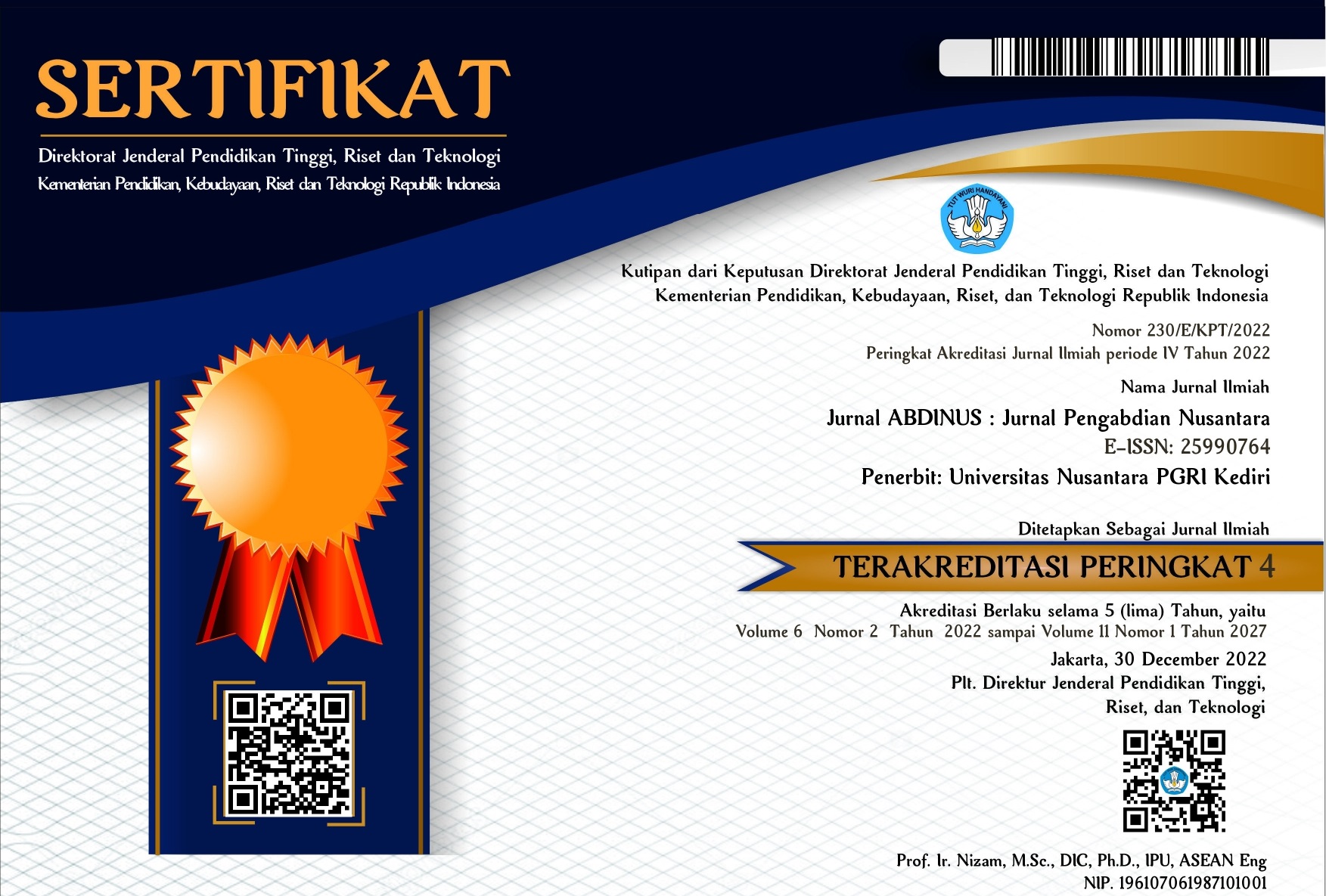Upaya Peningkatan Keterampilan Berbicara Menggunakan Bahasa Inggris Siswa-Siswi SMA Kristen Kalam Kudus Sukoharjo dengan Melibatkan Mahasiswa sebagai Speaking Buddies
DOI:
https://doi.org/10.29407/ja.v7i3.18640Keywords:
Peer-tutoring, Speaking buddies, RolesAbstract
Speaking as one of the productive skills is very important to be mastered by English language learners. However, teaching English in the context of English as a Foreign Language (EFL) has several challenges. Besides limited exposure to the language, another biggest challenge is that there are very few opportunities available for students to practice speaking in English. For this reason, SMA Kristen Kalam Kudus Sukoharjo held an extracurricular activity which is called as English Conversation Club (ECC) activity in collaboration with the English Language Education Program of Universitas Kristen Satya Wacana Salatiga by involving eight of the lecturers as instructors and nine students. This activity which aims to improve students' English skills used peer tutoring as its method. This activity was carried out as many as 8 online meetings through Zoom. The results of observations done by the instructors on the role of speaking buddies during the 8 meetings showed that the problems that were often faced by students when practicing speaking in English could be solved through the involvement of speaking buddies. In this activity, the speaking buddies play several roles in various activity sessions, such as organizers, resources, language controllers, and prompters.
Downloads
References
Afshar, H. S., & Asakereh, A. (2016). Speaking skills problems encountered by Iranian EFL freshmen and seniors from their own and their english instructors’ perspectives. Electronic Journal of Foreign Language Teaching, 13(1), 112–130.
Al Hosni, S. (2014). Speaking Difficulties Encountered by Young EFL Learners. International Journal on Studies in English Language and Literature (IJSELL), 2(6), 22–30. www.arcjournals.org
Firmansyah, M. S., & Alfian, M. (2022). Peningkatan Kemampuan Berpidato Berbahasa Inggris Siswa SMK Di Kabupaten Tegal. Jurnal ABDINUS : Jurnal Pengabdian Nusantara, 6(2), 275–284. https://doi.org/10.29407/ja.v6i2.15669
Harmer, J. (2007). How to teach English. In Pearson Education Limited (New Editio). Pearson Education Limited. https://doi.org/10.54414/mzlv3216
Leong, L.-M., & Ahmadi, S. M. (2017). An Analysis of Factors Influencing Learners’ English Speaking Skill. International Journal of Research in English Education, 2(1), 34–41. https://doi.org/10.18869/acadpub.ijree.2.1.34
Lim, L. L. (2014). A Case Study on Peer-Teaching. Open Journal of Social Sciences, 2, 35–40. https://doi.org/10.4236/jss.2014.28006
Maringga, E. G., & Ivantarina, D. (2023). Pemberdayaan Kelompok Teman Sebaya: Edukasi Penggunaan Terapi Komplementer Untuk Mengurangi Dismenorea Primer. Jurnal ABDINUS : Jurnal Pengabdian Nusantara, 7(1), 1–14. https://doi.org/10.29407/ja.v7i1.17334
Najabat, A., Anwer, M., & Abbas, J. (2015). Impact of peer tutoring on learning of students. Journal for Studies in Management and Planning, 1(2), 61–66. http://internationaljournalofresearch.org/index.php/JSMaP
Noprival. (2016). STUDENTS’ VOICE: EFL SPEAKING PROBLEMS ON ENGLISH DAY PROGRAM AT ONE SENIOR HIGH SCHOOL IN INDONESIA. Jurnal Ilmiah Universitas Batanghari, 16(1), 77–81. http://dx.doi.org/10.33087/jiubj.v16i1.84
Osayimwense, O. (2017). A Literature Review on “Peer Tutoring.”
Salahuddin, J. F., & Rahman, A. (2022). The impact of Covid–19 pandemic on the students’ communication in English at the University of Muhammadiyah Bone. Journal of Teaching and Education for Scholars (JOTES), 1(1), 28–37. https://www.ojs.ycit.or.id/index.php/JOTES/article/view/26
Sarmin. (2017). KONSELOR SEBAYA: PEMBERDAYAAN TEMAN SEBAYA DALAM SEKOLAH GUNA MENANGGULANGI PENGARUH NEGATIF LINGKUNGAN. BRILLIANT: Jurnal Riset Dan Konseptual, 2(1), 102–112. http://www.jurnal.unublitar.ac.id/index.php/briliant. http://dx.doi.org/10.28926/briliant.v2i1.30
Ur, P. (1996). A Course in Language Teaching: Practice and theory. In M. Williams & T. Wright (Eds.), Cambridge Teacher Training and Development. Cambridge University Press. https://doi.org/10.1017/cbo9780511732928
Zhang, S. (2009). The Role of Input, Interaction and Output in the Development of Oral Fluency. English Language Teaching, 2(4), 91–100. https://doi.org/10.5539/elt.v2n4p91















